West Nile Virus
West Nile virus entered California in 2003 and Alameda County in 2004. Since its introduction, activity has been detected every year. West Nile virus is a potentially serious disease and proper precautions should be taken to prevent infection.
What is West Nile Virus?
West Nile virus (WNV) is a mosquito-borne disease that has been found in parts of Asia, Eastern Europe, Africa and the Middle East. The virus was first detected in the United States in 1999 in New York City and has since spread throughout the continental U.S. Most people who become infected with the virus have only a mild illness or no symptoms, but in rare cases they can become seriously ill. The types of mosquitoes that can transmit WNV are common mosquitoes in Alameda County. Our goal is to decrease the numbers of mosquitoes in the county thereby minimizing the possibility of WNV transmission.
What are the symptoms?
80 percent of people who are infected with West Nile virus will show no symptoms and the disease often passes unnoticed.
About 20 percent of people will have mild symptoms that develop between 3 to 14 days after they are bitten by an infected mosquito. The symptoms, some of which resemble a cold, can include fever, headache, body aches, nausea, vomiting, and sometimes swollen lymph glands or a skin rash on the chest, stomach and back. The symptoms can last anywhere from a few days to several weeks.
In a few cases (1 in every 150 cases), the symptoms will be severe. These can include high fever, headache, neck stiffness, stupor, disorientation, coma, tremors, convulsions, muscle weakness, vision loss, numbness and paralysis. These symptoms may last several weeks, and neurological effects may be permanent.
How is it spread?
In most cases, West Nile virus is spread by an infected mosquito to a bird. The bird in turn gets bitten by an uninfected mosquito, which then carries the virus to other birds. As you can see in the illustration below, those infected mosquitoes will occasionally bite other hosts such as horses and people, and transmit the virus to them.

What is the treatment?
There is no specific treatment for WNV infection. In cases with milder symptoms, they pass on their own. In more severe cases, people usually need to go to the hospital where they can receive supportive treatment including intravenous fluids, help with breathing and nursing care.
Who is at risk?
Those most at risk of developing severe symptoms are people aged 50 and over, as well as those who have compromised immune systems. It should also be noted that if you spend a lot of time outside, your risk factor goes up sharply.
What you can do…
There are many things that can be done to make your home and property less welcome to mosquitoes. The following are suggestions to prevent mosquitoes from breeding near your home and decrease your chances of being bitten:
- Eliminate all standing water on your property, and ask your neighbors to do the same
- Report dead birds – call 877-WNV-BIRD (877-968-2473)
- Stock your fishpond with free mosquitofish from us
- Screen your windows and doors, and make sure they fit tightly. Repair or replace screens with tears or holes.
- Minimize outside activity at dawn and dusk
- When outside, wear long sleeve shirts, long pants, and use insect repellent (follow label directions carefully)
- Keep outside lighting to a minimum near entry doors (some mosquitoes are attracted to lights)

